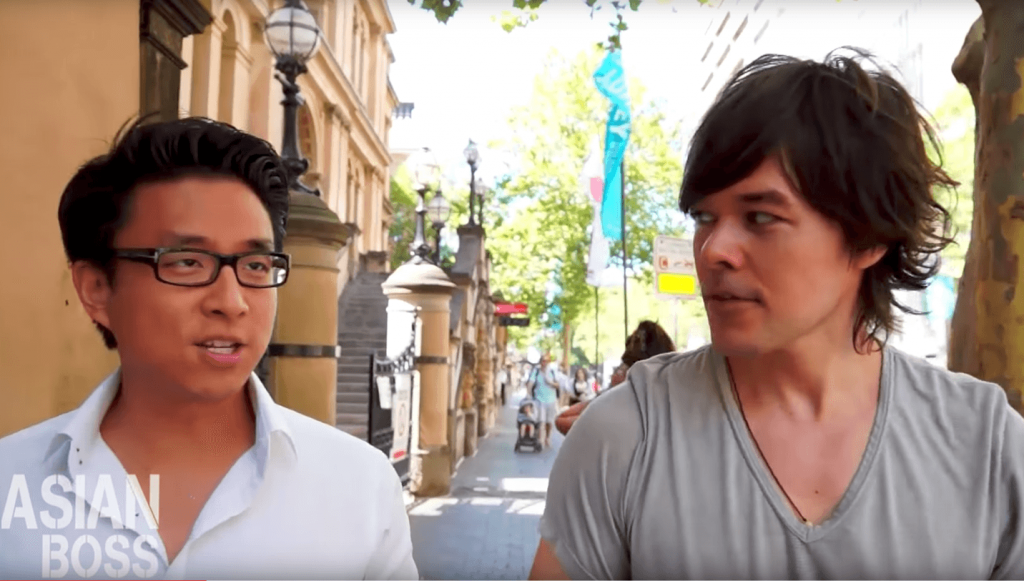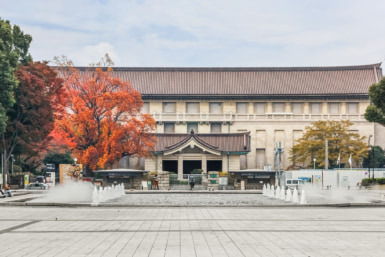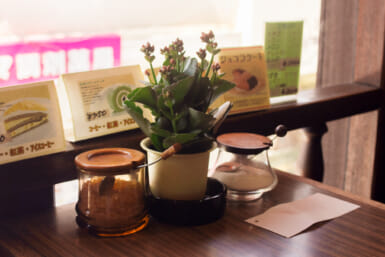Illustrations by Bunny Bissoux
Using the street interview style, Asian Boss YouTube channel founders Kei Ibaraki and Stephen Park quiz people on how they feel about topics as varied as North Korean defectors and Japan’s death-from-overwork syndrome. Here, they tell us about their successes, their challenges – and the art of getting Tokyoites to open up.
“With what I’m doing, I don’t really have days off,” Kei Ibaraki says, while taking a break. It’s close to 10 at night. He’s been filming all day and is readying himself for an all-night editing session. Still, there’s no sense of being downtrodden. The eight hours of bed he is prepared to pass up will add to his ideas set to unfold over the next three months.
It’s not necessarily a shock that he is upbeat. Positivity and YouTube content creators are synonymous. The main difference here is that Ibaraki keeps his personal happiness off the screen. Onscreen he’s an observer, an active listener who is shy on personal pronouns. A rare quality, it is part of his and co-founder Stephen Park’s appeal in how they run their social media company Asian Boss. “We just want it as neutral as possible,” he says.
What is Asian Boss?
The pair has made themselves a successful brand by conducting street interviews across major cities in Japan and Korea, although recently they have veered towards in-depth one-on-ones and panel discussions, while also setting up operations in China and India. The Asian Boss formula is a simple one, but the product has proven illuminating, attracting more than 400,000 subscribers on YouTube. Whereas most content creators who gain traction by opining on Asian societies tend towards sweeping overviews (“10 Things I Hate About Japan” or “How to Date Asian Women”), Ibaraki and Park tend towards more specified areas, exploring numerous “Asian trends or social issues, ones where I almost want to fix the problem.”
“I mean, look, here’s the thing: where do stereotypes come from? They come from not knowing about something. So by getting people to talk you move towards building a greater understanding, you become inclusive.”
“People gear towards us because they’re used to fragmented bullshit on TV. Younger generations don’t watch mainstream media. There, people just hear what they want to hear, but you need both sides of a story. It’s just a matter of listening, which gets rid of bigotry,” says Ibaraki. Of course, he is quick to note that this was never part of the original plan. They did not choose video for any specific purpose. “We just started doing it. Through trial and error of trying different platforms, we stumbled upon the street interview style.” That was almost four years ago. At the time, Ibaraki had been working in retail and eco-architecture. Park was working as a lawyer. “Fundamentally we just wanted to add value to people’s lives, so while working full-time, we did videos on weekends.”
“Then, when we realized this was having an impact, things became serious. It wasn’t a clean cut though. I had to slowly reduce my retail hours until I could make ends meet.” Initially shooting in Australia, the earliest videos explored the various facets of dating, but soon thereafter they diversified, before relocating to Korea, where they still reside. From there, Ibaraki decided they should expand to Japan.
The Challenges of Shooting Asian Boss in Japan
Privacy, he notes, was the initial challenge here. “We get maybe eight interviews per topic. We just want to learn from other perspectives, end stereotypes and conflicts,” he adds. On Japanese streets, however, “asking random people about issues that need to be discussed … you might get auto-responses. In Australia, people are up for talking. You approach three people and you will get one piece of solid material.” At one point in Tokyo, he recalls being rejected by “38 people” in a row, while on average “it takes seven or eight people to get just one short response.”
If anything, that idea of hiding one’s true self from the public has been the strength in the Japanese section. While recently the Asian Boss duo has amassed an enormous number of hits for their series on North Korean defectors, one of the subtler gems has been understanding public facades in Japanese society, which in turn perpetuate such negative cycles like sexism and homophobia. Polite, but gutsy, Ibaraki makes asking “why” an engaging spectacle when handed replies either too presumptive or general. Critical thinking is his core value. If somebody says something, why is it that they believe it to be so? “I mean, look, here’s the thing: where do stereotypes come from? They come from not knowing about something. So by getting people to talk you move towards building a greater understanding, you become inclusive.”
Here, he reads off a message from a follower: “Because of you, I started learning English. I’m more proactive towards different nationalities. Thank you.”
“Man”, he says with awe. “That’s amazing. You can have that impact. That gets me excited.”
Watch the Asian Boss interviews at www.youtube.com/user/askasianboss
What Do the People Say?
Asian Boss is gathering a reputation not only for the interesting – and sometimes controversial – topics covered, but also for being able to encourage people to talk freely on the spot. Here are excerpts from four of their recent Japan-focused interviews…
Is the Japanese Education System Failing?
Man: “You had to follow the rules no matter how you felt about it. For example, we couldn’t ever use mechanical pencils.”
Kei: “Why?”
Man: “I don’t know. Not even the teacher knew when I asked them, but we had to follow it, because it was the rule. That’s how even if we found a particular rule strange, we wouldn’t question it. That’s the type of people the system is creating.”
How Do the Japanese Feel About LGBT?
“I do see a lot of gay people on TV shows, but I’ve never met anyone in person that said they were gay. I’m actually a student myself, but even at school, no one really talks about these issues.”
“You mean it’s almost close to 1 out of 10 people [that are gay in Japanese society]? … We’ve only come this far as a species because we had both genders. If either one didn’t exist, we’d go extinct.”
Why Japanese Die From Overwork (Karoshi)
“In other countries, you might be judged on your actual job performance, but in Japan you are judged on how hard you ‘appear’ to be working. That’s what you get evaluated on.”
“Most companies take employees working overtime for granted. They equate working overtime with better job performance.”
Are Japanese Girls Really Dumb?
“Japanese women really want to get married, so by hiding their true reality [high salary, university education and so on], if that can help them get into a relationship, then that’s an option.”
“I don’t know if dumb is the right way to express it. It might be just holding their opinions, not like trying to be silly or anything. Even that they know something, they might just pretend that they don’t know.”
Updated On April 26, 2021













